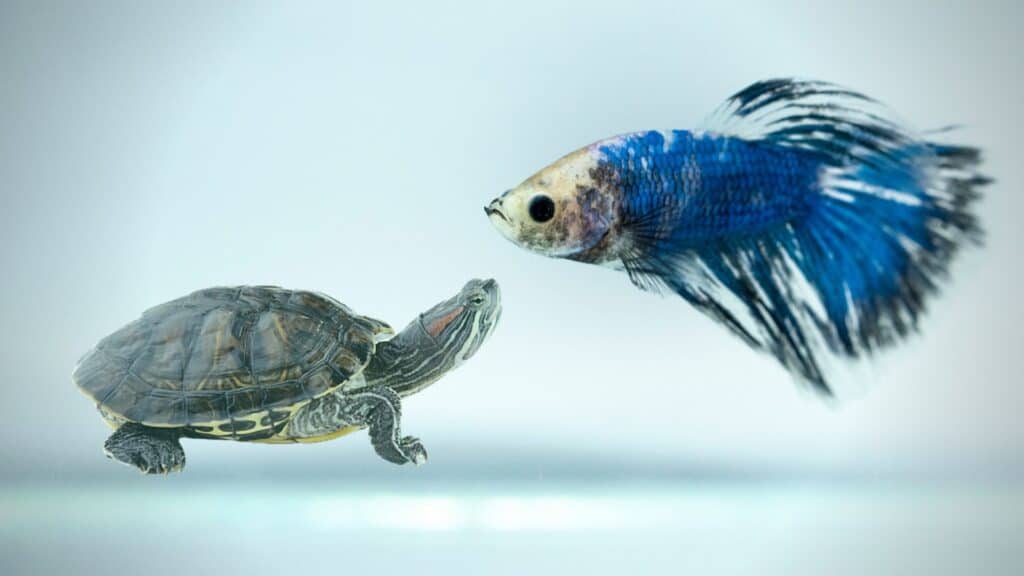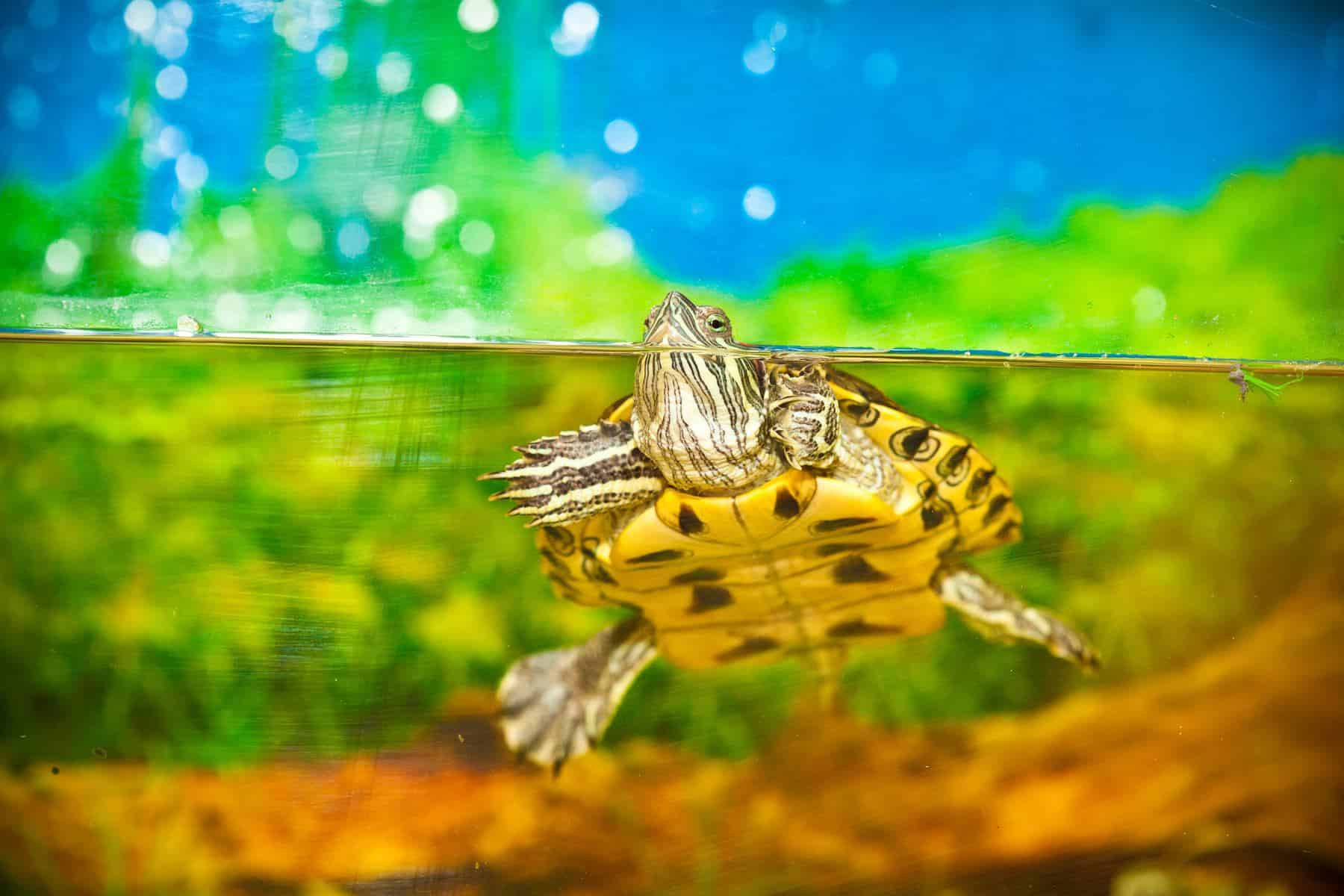If you’re wondering whether betta fish can live with turtles, the simple answer is no. You cannot keep a betta fish and turtle together, even if it’s temporary.
If you try to put a betta fish with any type of turtle species, the odds are that your fish won’t even last a week! Read on to find out why…
Can You Keep a Betta Fish and Turtle Together?
The reasons why you can’t keep a betta fish with a turtle include diet, space, and water parameters.
Diet
Most freshwater turtles that you see on the banks of ponds and lakes are omnivores; some species are strictly herbivores while others are carnivores.
In general, most turtle species will eat both plant- and animal-based foods, but it’s essential to research the diet of the specific species before you buy them!
In the wild, turtles eat plant matter, algae, insects, various larvae, and fish.
This diet does not change in the aquarium, and turtles need to be fed a variety of vegetables and algae-based foods as well as different types of worms, shrimp, and even eggs for protein. A very popular snack for turtles is feeder fish.
Instinctively, turtles have evolved to consider moving fish as food. Unfortunately, they are not able to distinguish between a meal and a tank mate, making it seem like an added betta is something to eat. Many hobbyists even give their turtles guppies, minnows, and other inexpensive fish as a treat!
There is no true way to work around this as your turtle will always want to eat your betta if put together in the same aquarium. Even if your turtle species is small, it can still take chunks out of your fish.
At the very least, turtles can nip at your betta’s fins and cause permanent damage.
Space
Most turtle species are very active and can grow to a considerable size. This is in contrast to betta fish that reach a maximum size of about 3 inches (7.6 cm).
The minimum tank size recommended for most turtlesis at least 50-100+ gallons (151.4-378.5+ L). Betta fish, on the other hand, need a mere 5-10 gallons (18.9 L) to thrive.
If by some chance your betta fish does not get eaten by your turtle, it is very likely that he will at least feel intimidated and stressed, and may stay hidden out of sight.
Water Parameters
Don’t be fooled that some water parameters overlap between these two species.
Most turtles need a water temperature between 75-85° F (23.9-29.4° C) with betta fish fitting right in that range between 78-80° F (25.6-26.7° C); turtles also need a hotter, raised area of the tank in order to bask as they are cold-blooded.
The problem arises with keeping water parameters in check. For the most part, turtles are fairly hardy and can escape poor water conditions. However, betta fish cannot.
In addition to being very active, turtles are very messy. Not only do they create a lot of waste in the water, but they can kick up the substrate and bring in other bits of the substrate and organic matter from the raised area of the tank.
In general, turtles can handle much higher amounts of ammonia than betta fish. This does not mean that turtles will tolerate extraordinary levels of ammonia, but if something happens and there is an ammonia spike, you have slightly more time to correct the issue.
This is in contrast to the betta fish, which will start to feel the effects of ammonia immediately. For both betta fish and turtles, the tank should always be pre-cycled with 0 ppm ammonia, 0ppm nitrite, and manageable nitrates (<40 ppm nitrates).
However, if something is wrong with your water, you will probably see it reflected in your betta first instead of your turtle. Turtles can also temporarily withstand chlorine if it happens to enter the system whereas betta fish cannot.
Turtles and Bettas Require Different Filters
As we’ve said, turtles tend to be quite messy animals. They really need a powerful canister filter to deal with all the waste they produce, along with the debris they’ll stir up from the bottom of the tank. But remember strong filters produce strong currents.
On the other hand, bettas need slow-moving water to feel at home. They evolved in still or slow-moving pools and simply don’t have the physical setup to deal with strong currents.
A filter that is too powerful can cause your betta permanent stress or, in the worst case, may even suck your betta into the intake. A gentle sponge filter, therefore, is much more suitable for betta fish, but definitely not for turtles!
Bettas Are Slow-Moving Fish
While betta fish can be fairly active, and sometimes aggressive, you won’t see them darting around the tank like danios and rasboras!
Bettas tend to live a much more sedate pace of life. Their long fins are not designed for swimming quickly, and they tend to struggle even swimming against moderate water currents.
This is a problem when matching a betta fish with a turtle because turtles will tend to quickly snap any fish that can’t get away in a hurry!
Although turtles can appear to be slow-moving, this is rather deceptive, and they can certainly move fast when snapping up their prey.
If you want to keep turtles with fish, you’ll need to choose a turtle that is relatively benign, and also fish that can swim quickly!
Turtle Species That Can Be Kept With Fish
Turtles that are better suited to living with fish include the Box turtle, Mud turtle, and Musk turtle. These species are either more vegetarian in their diet than most, or are less adept at hunting.
Red-Eared Slider turtles, Painted turtles, and Cooters, on the other hand, tend to be better hunters and may enjoy snapping up fish regularly.
Snapping turtles should never be kept with any kind of pet fish. These are highly carnivorous turtles and will make light work of even the largest or fastest of aquarium fish.
Fish Species That Can Be Kept With Turtles
Luckily, there are a few fish that can be kept with turtles in the same tank. Keep in mind that compatibility will still largely depend on the species of the turtle and the tank size.
Keeping fish with turtles is always a bit of a gamble, and long-term compatibility is never guaranteed!
Tropical Community Aquarium
If you want to keep tropical fish species with your turtles, then you’re going to need to choose species that are fast and can escape from your turtle quickly.
Here are some of the better turtle tank mates:
- Danios: Giant danios have a good chance of not being eaten due to their size and speed. Zebra danios and Celestial Pearl danios are also pretty fast and should have a good chance of escaping from turtle attacks!
- Several barb species such as Rosy barbs, Tiger barbs, and Denison barbs are fast movers and can quickly get themselves out of trouble.
- Tetras: Neon tetras are some of the most popular as they bring a lot of color to the aquarium but other fast-moving species such as Cardinal tetra and Black Phantom tetra may work as well.
- White Cloud Mountain minnows: These fish are inexpensive and bring activity to the top of the tank. However, you might need to work at getting the water temperature compatible for them and your turtle.
- Cichlids: Robust cichlids such as Oscars and Convict cichlids may also make compatible tankmates for more vegetarian species of turtle in a larger tank.
Fish To Avoid Pairing With Turtles in Aquariums
For the most part, there are more fish that you will want to avoid keeping with your turtle than those that are compatible!
Some of the most common mistakes include goldfish and plecos.
While many people have tried keeping a goldfish in a turtle tank, there are several problems. Goldfish create an incredible amount of waste and are slow-moving fish. They prefer water to be less than 75 Fahrenheit and are easily eaten.
Plecos are another common choice to add to the turtle aquarium because they help clean up algae. But when kept with turtles, plecos may suck onto the turtle shell, which shouldn’t normally be a problem, unless there is a size incompatibility. Imagine a foot-long pleco stuck onto a baby turtle’s shell! Not very comfortable for your turtle!
Plecos are also relatively slow-moving and a small one may be easily snapped up by an adult turtle.
Livebearers like guppies, platies, and mollies are also occasionally recommended to share the same space as turtles, but be careful you understand the context correctly! These fish (especially guppies) are sometimes used as a ‘feeder fish’ – i.e. a fish to feed your turtle, rather than making good long-term tank mates!
In a pond ecosystem, there is more room for your fish to avoid your turtle, in which case goldfish and guppies may become suitable, but unless you’re thinking of going for an enormous 500-gallon+ aquarium, these species are best avoided.
Of course, betta fish are not on the list of approved turtle tank mates.
Keeping Fish Alongside Turtles Successfully
We’re not going to let you believe that keeping any kind of fish alongside a turtle is a simple matter.
Turtles like to eat fish, make a mess, and also have some different tank requirements to fish. But if you have some experience with both turtles and fish and really wanted to give it a try, here are some tips that could help.
Tank Size
The most important aspect to consider for keeping fish and turtles together successfully is the size of the tank!
Most turtle owners like to keep their pets in a tank that’s at least 80 gallons. If you want to keep fish as well, you should be thinking upwards of 100 gallons.
You need to make sure that you have space for your fish to escape from menacing turtle attacks, as well as give your turtle enough room for a raised-landing area.
Hiding Places
As well as a big enough tank, you must make sure your fish have enough hiding places to stay out of harm’s way.
Rocky caves, bits of driftwood, and dense aquatic plant foliage are all good places for your fish to hide from a hungry turtle.
Age of Turtle
We’ve already spoken about the different types of turtles, but your turtle’s hunting and dietary habits will also depend a lot on its age.
Some common pet turtle species such as the Red Eared Slider turtle will eventually grow old enough to enjoy plenty of vegetable matter in their diet, but while they’re young and growing fast, they need significantly more protein.
Since fish are such a rich source of protein, it means that younger turtles tend to be more dangerous to fish than older ones.
Keep Your Turtle Well Fed!
A well-fed turtle is less likely to try to hunt your pet fish than a hungry one! Pet turtles tend to be fed meaty foods such as tadpoles, worms, snails, slugs, grasshoppers, crickets, and other insects.
As they grow older, more vegetable matter can be incorporated into their diet – they especially love dark leafy greens.
With a few exceptions, a turtle’s diet is rather different from that of most fish! This means you’ll have to attend to the dietary needs of your turtles and fish separately.
Keeping a Turtle With Fish in a Pond
If you live in a warm enough area, you may be able to host a turtle in a garden pond. This must be well planned, with a solid perimeter fence to prevent your turtle from escaping and potential predators from entering.
In a large enough pond, all kinds of fish could live alongside your turtle provided they’re suitable for the climate. Koi carp are a popular choice since they are big and robust, but the species of turtle still needs to be chosen carefully for long-term compatibility.
Unless you live by the equator, however, your outdoor pond won’t be suitable for betta fish!
Conclusion
Even though it may be tempting, it’s never a good idea to keep a betta fish alongside a turtle. Your betta fish’s long fins and slow-moving nature make him an easy snack for even the most benign species of turtle or terrapin!
Keeping any kind of fish with a freshwater turtle will be challenging. Turtles are big, messy, and almost always enjoy eating fish.
If you have the necessary experience and a large enough tank, then some species of fish and turtles may be compatible, but it’ll always be a gamble.
To check out some better choices of tankmates for your betta, such as other fish, shrimps, and frogs, click here!











